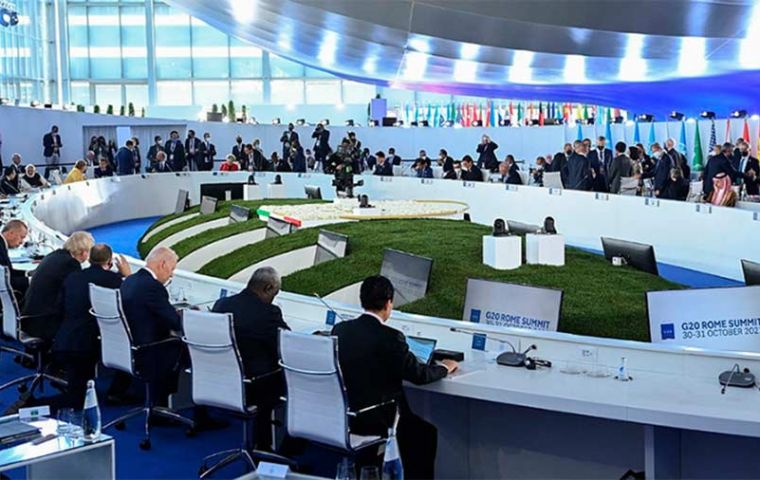MercoPress. South Atlantic News Agency
G20 aims at 70% of the world vaccinated against COVID-19 by mid-2022
 A new body was created to pursue immunization targets
A new body was created to pursue immunization targets World leaders gathered in Rome for the G20 Summit have concurred on the goal of having at least 70% of the population vaccinated against COVID-19 by 2022.
In order to achieve that objective, which is in line with the World Health Organization's (WHO) guidelines, drugs need to be distributed to less favored countries, it was agreed.
Economy and Health Ministers discussed the issue Friday and drafted an agreement whereby 40% of the world's population is to be immunized this year and 70% by 2022.
Italian Prime Minister Mario Draghi explained this wasa to achieve “flatly the objective of a true and equitable recovery” and was agreed by all the leaders gathered at the summit.
On its first day of debates, the G20 held a panel entitled “Global economy and health” to address solutions to the health crisis caused by the coronavirus pandemic over the last year and a half.
In addition to the donations of vaccines to developing countries, the G20 leaders agreed on the need to increase productive capacity and transfer technologies to regions where it was most necessary to prevent future health crises.
Italy, with the rotating presidency of the G20 this year, proposed to “make up for the insufficient coordination between health and financial authorities evidenced during the pandemic”
The ministers had agreed on the steps necessary to achieve the numbers of people vaccinated by mid-2022 as planned.
The also entertained the idea of creating a task force to fight future pandemics.
However, the ministers were unable to agree on the separate funding mechanism proposed by the United States and Indonesia, but said the task force would explore options to mobilize funds to advance pandemic preparedness, prevention and response.
“To help advance the global goals of vaccinating at least 40% of the population in all countries by the end of 2021 and 70% by mid-2022 ... we will take steps to help boost vaccine supply and essential medical products and supplies in developing countries and remove relevant supply and financing restrictions,” the ministers said in a statement.
The ministers said they were creating the new body because the COVID-19 pandemic had exposed “significant deficiencies” in the world's ability to coordinate its response.
In addition, they pledged to support “all collaborative efforts” to provide access to safe, affordable, quality and effective vaccines, therapies, diagnostics and personal protective equipment, especially in low- and middle-income countries.
To meet vaccination goals, they said they would work to boost the supply of vaccines and essential medical products and supplies in developing countries, while removing restrictions on supply and financing, but did not give specific details.
They also called for boosting supply chain resilience through voluntary technology transfer centers in various regions, such as the recently established mRNA centers in South Africa, Brazil and Argentina, and through joint production and processing agreements.
The call for a voluntary transfer of mRNA technology means that talks about the idea of a temporary exemption from intellectual property rights on Covid-19 vaccines and therapies, originally proposed by South Africa and India and now championed by the United States, remain stuck in The World Trade Organization.




Top Comments
Disclaimer & comment rulesCommenting for this story is now closed.
If you have a Facebook account, become a fan and comment on our Facebook Page!